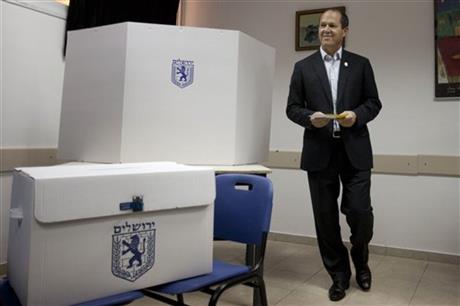
By DANIEL ESTRIN
Jerusalem mayor Nir Barkat, votes in Jerusalem, Tuesday, Oct. 22, 2013. The mayors of Israel’s two largest cities are fighting for their political survival in municipal elections with national implications. (AP Photo/Sebastian Scheiner)
JERUSALEM (AP) — The secular mayor of Jerusalem was fighting for his political survival in a closely watched re-election bid Tuesday, facing a challenger backed by two of Israel’s biggest kingmakers in the centerpiece race of nationwide municipal voting.
Nir Barkat, a successful former high-tech entrepreneur, was elected in 2008 in a victory seen as a blow to years of dominance by ultra-Orthodox Jews over the city’s affairs.
His challenger in Tuesday’s vote, Moshe Lion, is backed by two key politicians elbowing to reclaim their former political glory, one of them the chairman of an ultra-Orthodox party.
Jerusalem’s Arab community could in theory swing the city election, but — as in previous years — it is boycotting this year’s vote to protest Israel’s control of the city. The Palestinians seek east Jerusalem as their capital, and the international community does not recognize Israel’s control of the area.
Israeli media reported low turnout: Only 23 percent of potential voters had cast their ballots by 8 p.m. local time (5 p.m. GMT), two hours before the polls close. That would appear to favor the challenger, particularly as media observed what seemed like higher turnout in religious neighborhoods.
Lion, formerly a director general of the prime minister’s office, has the support of Israel’s former foreign minister Avigdor Lieberman and Ariyeh Deri, chairman of ultra-Orthodox political party Shas.
Both Lieberman and Deri have much at stake. Lieberman’s party lost seats in the last national election, and he is awaiting a verdict next month in an ongoing corruption trial. Shas was once a kingmaker in Israeli politics, but it no longer sits in the ruling coalition, and it faces a leadership crisis following the recent death this month of its spiritual leader, Rabbi Ovadia Yosef.
Recent polls have shown Barkat, who has generally won plaudits for invigorating Jerusalem during his term, in a commanding lead. But the polls also showed large numbers of voters undecided. Lion has been trying to court ultra-Orthodox rabbis, whose words guide tens of thousands of followers, in a bid for victory.
In a last-minute blow to Lion, two leading ultra-Orthodox rabbis declined to endorse him late Monday, telling their adherents to vote according to their conscience.
“The votes today will determine how the city’s going to look in the next five years. There’s no doubt in my mind, we know the majority of the residents of Yerushalayim liked the last five years and they are really interested and eager to have an additional five years with me,” Barkat said, using the Hebrew word for the city.
Jerusalem is one of the world’s most difficult cities to govern: It lies at heart of the Israeli-Palestinian conflict and is the epicenter of secular-religious battles for control in Israel.
It is also Israel’s largest city, and its 800,000 residents include secular, modern Orthodox, and ultra-Orthodox Jews as well as Palestinians.
The Arab population lives almost entirely in east Jerusalem, the sector captured by Israel in 1967 and claimed by the Palestinians as their capital.
As he cast his vote on Tuesday, Prime Minister Benjamin Netanyahu reiterated his stance on the city’s future.
“So long as I am prime minister, Jerusalem will remain our united capital. That’s how it will be,” he said.
The Israeli government is responsible for peace talks with the Palestinians. While the Jerusalem mayor has no official say in the city’s political future, he can affect local Arab-Jewish issues such as building permits, construction, education and public services.
Barkat says that in his five years as mayor, he has halted the exodus of tens of thousands of secular Jerusalemites, revived the city’s cultural life and improved the quality of life for its Arabs.
But surprisingly, Jerusalem remains one of the poorest cities in Israel, and Lion says Barkat placed too much emphasis on cultural activities at the expense of affordable housing and sanitation. Dovish Israelis have also accused Barkat of neglecting east Jerusalem’s Arabs and having a cozy relationship with hard-line settler groups.
In other cities in Israel, mayoral contenders were campaigning Tuesday to make election history.
Lawmaker Nitzan Horowitz was looking to unseat popular Tel Aviv mayor Ron Huldai to become the country’s first openly gay mayor, and in the Arab city of Nazareth, firebrand lawmaker Hanin Zoabi was running against a powerful incumbent in a bid to become the country’s first female Arab mayor.
One race in the northern Israeli town of Nesher turned into a family affair: Mashiach Amar was running against his brother David, the town’s mayor.
Police spokesman Micky Rosenfeld said officers are investigating several violent incidents surrounding the elections.
On the eve of the vote, a lawyer affiliated with elections in the city of Lod was shot and wounded by gunmen.
In the Arab city of Sakhnin a brawl broke out between dozens of voters at a polling station. And at a station in Jerusalem a man pulled out a knife and waved it around yelling. It wasn’t clear what he was shouting about and he ran away without causing harm.



